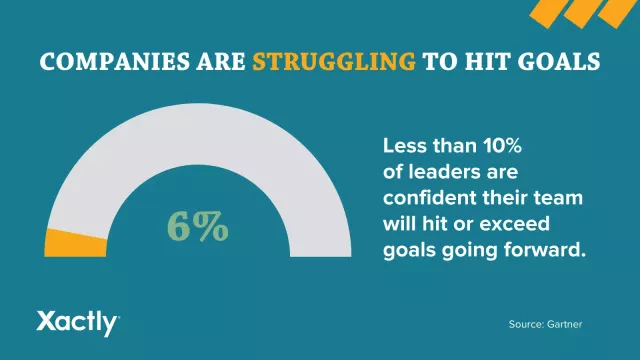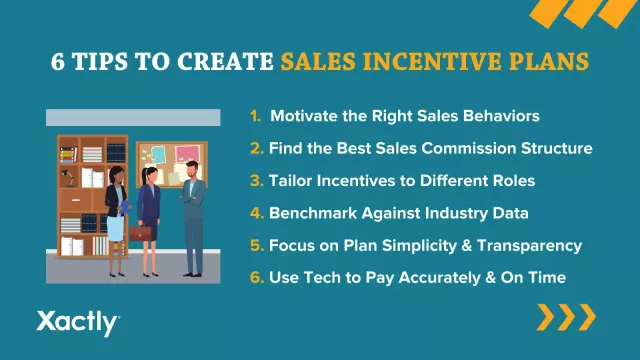
Sales compensation is all about balance. You need your incentives to motivate reps and drive the right sales behaviors, but you also need to design them in a way that ultimately allows you to hit your revenue and growth targets and drive profitability. And getting your planning right has only become more essential since the pandemic.
Gartner reports that only six percent of leaders are confident in their team’s ability to meet or exceed revenue goals going forward. This is challenging because there are many parts that come together to form your sales incentive compensation plan, but with the right tools and processes in place, you can have greater confidence and control of your compensation planning.
To help, here are six tips to help you create and execute powerful sales incentive plans (plus some bonus templates to get you started).
1. Motivate the Right Sales Behaviors
In order for incentive compensation to be effective, it needs to motivate your sales team to perform behaviors that work towards your overarching company goals. Aligning your incentives to higher objectives ensures that sellers can prioritize more effectively, understand what’s expected of them, and that every action they take works towards achieving those targets.
It’s also important to consider the spread of performance across your sales team. In an ideal world, every rep would be a top performer and exceed their quota, but realistically, you have to expect that 100 percent of reps will not meet their individual goals. Your incentive compensation plans need to reward your top sellers and encourage mid- and low-performers to improve their sales achievement.
2. Find the Right Sales Commission Structure
When building incentive plans, you also should consider the best way to pay reps. The most common form of variable compensation is a commission. There are a variety of sales commission structures you can use to pay reps and motivate them to close deals.
The most common are:
- Revenue Commission Structure: Reps earn a flat percentage of total revenue from each deal closed
- Gross Margin Commission: Reps earn a flat percentage of gross revenue from each deal closed
- Tiered Commission Structure: Reps earn higher commission percentages as they reach thresholds of total revenue sold
- Multiplier Commission: Reps earn a percentage of commission based on their progress towards quota
- Straight Commission: Reps earn no base salary pay and earn only commission
- Draw Against Commission: Reps earn a cash advance that may or may not have to be repaid in the next pay period
3. Tailor Incentives to Different Roles
The roles on your sales team all have different tasks and responsibilities, and your sales incentive plans and commission structures reflect that. Each member of your team should have goals and incentives that are tailored to their unique role and are targets they have a direct impact on.
Managers and their reporting reps have different duties. Reps will most likely spend more time making calls and closing deals, while managers will likely split their time between calls and administrative tasks. Build your compensation plans so that they provide opportunities and goals that are aligned with the different roles on your team.
4. Benchmark Against Industry Data
HubSpot data shows that higher pay is a top reason for employees to leave their current role, and even as little as a 10 percent increase could encourage them to churn. Sales is a money-driven position. That makes competitive pay essential to attracting and retaining top performers.
The most effective way to ensure your pay is competitive is by benchmarking against industry data. Using an AI-driven compensation tool like Xactly Benchmarking allows you to compare different incentive structures and see how your compensation stacks up against your industry.
5. Focus on Plan Simplicity and Transparency
Simplicity is essential when it comes to incentive compensation. Reps need to clearly understand what is expected of them, the actions and deals they should prioritize, and really, how they can earn more money. Xactly data shows that compensation plans that measure reps on no more than three components are most effective at driving performance.
Transparency goes hand-in-hand with simplicity. Your compensation plans need to be clear, and you also need to focus on implementing them with transparent communication. Identify how plans have changed, how they align with new goals, and how reps will benefit from it.
6. Use Technology to Pay Your Reps Accurately and On Time
The average sales rep spends less than a third of their time selling, according to Salesforce. And when their compensation payout is late or inaccurate, that number is only going to decrease.
Xactly data shows that by automating your incentive compensation processes, you can eliminate up to 99 percent of commission errors. Intelligent tools like Xactly Incent seamlessly connect with your CRM to automatically calculate payouts, assign credits, and show reps their earned commissions in real-time.
This also frees up calculation and administration time, so your compensation team can focus on analyzing the performance of incentives rather than tediously calculating payouts manually.
Sales Incentive Plan Template Examples
Every company is unique, and incentives will vary depending on your business structure, product and service offerings, and industry. These sales incentive templates will give you a good foundation to set each role on your team up for success.
(You can learn more about tailoring incentives to specific sales roles in our Complete Guide to Sales Team Compensation).
Account Executive (AE)
Customer Success Rep
Sales Development Rep (SDR)
Sales Consultant or Specialist
Sales Manager
The Importance of Data in Creating Incentive Compensation
The most vital part of successful incentive compensation planning is basing your decisions on factual data. Xactly’s 2021 State of Global Enterprise Sales Performance survey found that nearly a quarter of businesses (24 percent) still rely on gut instincts to make their planning decisions.
What’s wrong with trusting your gut? While it might point you in the right direction, it can also be clouded with intuition bias. This approach is grounded in your past experience, and no matter how much expertise you have, that experience is limited. You can’t always see the entire picture unbiased, and you can’t realistically analyze all of your experience and compare it to predict future performance. That leaves you stagnant when unexpected disruptions hit, and it creates a gaping margin for error.
When you build your compensation plans on a foundation of data, you’re able to make decisions based on facts, rather than gut instinct. You can then take that data and use an intelligent Incentive Compensation Management (ICM) solution like Xactly Incent to better understand the effectiveness of your compensation plans, make real-time adjustments, and easily find new ways to improve existing incentive plans.
That way, you can trust you have the best compensation plans in place at all times to motivate reps and keep you on track to reach your goals. To learn more about building strategic compensation plans, download “The 2021 Guide to Successfully Managing Sales Compensation.”




